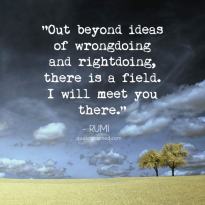 Dialogue is an over-used and much abused term for a very specific means of communication that we rarely employ effectively today. As a practitioner of dialogue, I have studied and learned from three thinkers who represent three different traditions and are woven together into what I offer to students today. The three thinkers are:
Dialogue is an over-used and much abused term for a very specific means of communication that we rarely employ effectively today. As a practitioner of dialogue, I have studied and learned from three thinkers who represent three different traditions and are woven together into what I offer to students today. The three thinkers are:
- Professor David Bohm, physicist
- Dr. Peter Senge, MIT professor and business consultant
- Gregory Kramer, teacher of Insight Dialogue
For instructions on the practice, see:
Insight Dialogue
Thinking about Dialogue
While the word “dialogue” is often used today as a substitute for polite discussion or conversation, it is used here to signify a specific discipline with a particular meaning and intent. A dialogue is a group communication process in which participants practice certain techniques to enhance their individual and collective learning. In dialogue there is a shared commitment to inquiry without necessarily reaching a decision or taking a specific action. In fact, the expectation or even a hope that a decision will be achieved by consensus or otherwise is enough to derail the dialogue process, especially among beginners.
It may be useful to think about what a dialogue is not. As stated above it is not a decision-making process, although it can result in relationships among group members that make decision-making much easier. It is not a tool for planning action, yet it can produce the kind of mutual respect and understanding that improves the likelihood of successful group action. A single individual does not lead it, however a facilitator is needed to help get it started and guide the process.
The root of the word “dialogue” is from the Greek “dia” or through and “logos” or word or meaning. Therefore, the dialogue process is a stream of meaning that flows through and among the participants. On the other hand, the word “discussion” has the same root as percussion and concussion. A useful image of a discussion might be a ping-pong game using words that bounce back and forth. In dialogue, members of the group can explore but go beyond any individual understanding. New insights may be gained that were not possible through thinking in isolation. Participants help each other observe the incoherence in each other’s thought as people learn how to think together, sharing thoughts, emotions, and feelings while reflecting on their own.
Early in the creation of a dialogue group, a decision should be made regarding its intent. This is important to avoid creating expectations that will go unmet and subsequent disappointment and criticism of the effort that is sure to follow. Ask the question, is the primary purpose of this work to make a decision or take some action or, is the intent improved individual and collective exploration and understanding of a situation (which may or may not result in a decision or action). This is important. If the primary intent is exploration and learning through inquiry, insight dialogue is in order.
classes are cancelled on Dec. 4)
Best references on Dialogue
- Bohm, D. On Dialogue. Routledge: London. 2004
- Ellinor, L. and G. Gerard. Dialogue: Rediscover the Transforming Power of Conversation. John Wiley & Sons.
- Kramer, G. Meditating Together, Speaking from Silence: Experiencing the Dharma in Dialogue. Metta Foundation, Portland OR. (info@metta.org).
- Senge, P.M. The Fifth Discipline: The Art and Practice of The Learning Organization. Currency/Doubleday. 1990.
- Wheatley, M.J. Turning to One Another: Simple Conversations to Restore Hope to the Future. Berrett-Koehler.
- Web Page – https://insightdialogue.org/relational-practices/insight-dialogue/. This web page provides detailed instructions on practicing Insight Dialogue.
Best related references
- Bohm, D. Thought as a System. Routledge: London. 1992.
- Bohm, D. and D. Peat. Science, Order, and Creativity: A Dramatic New Look at the Creative Roots of Science and Life. Bantam Books. 1987.
- The Awakening of Intelligence. Harper/Collins. 1973.
- Krishnamurti and D. Bohm. The Ending of Time. Harper/Collins.
- Peat, D.F. Infinite Potential: The Life and Times of David Bohm. Addison-Wesley Publishing Co. Reading, MA. 1997
- Schon, D. A. The Reflective Practitioner: How Professionals Think in Action. Harper/Collins. 1983.
- Varela, F.J., E. Thompson and E. Rosch. The Embodied Mind: Cognitive Science and Human Experience. MIT Press. 1996.